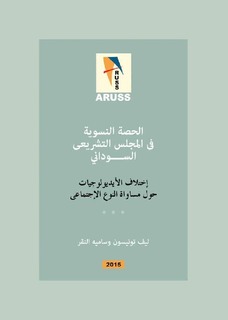The Women's Quota in Conflict Ridden Sudan (in Arabic)
Working paper
Permanent lenke
http://hdl.handle.net/11250/2475357Utgivelsesdato
2015-09-01Metadata
Vis full innførselSamlinger
- Publications [1488]
Sammendrag
This article explores women's substantive representation in Sudan's National Assembly. It examines the extent to which female legislators in the National Assembly represent women's interests, paying special attention to legislative initiatives and accomplishments following the signing of the peace agreement in 2005. The article highlights polarization rather than cooperation between women activists and women in the government as an important factor in explaining the lack of legislative accomplishments. There are competing gender ideologies between women activists demanding gender equality ( musawah ) and female legislators calling for gender equity ( insaf ). They are operating from isolated islands. The article argues that this limits the possibilities for a reform of Sudan's laws. Further, the increasingly polarized political landscape, limits the possibilities for even minor reforms on women's issues in the few areas where there is in fact a broad agreement between women activist and women in government on what constitutes acting in the interest of Sudanese women. Particularly after the International Criminal Court issued an arrest order for president Bashir in 2009, he has on more occasion than one turned to the religiously conservatives for support. While the religiously conservatives have the president's ear, the reformist voices within the government are marginalized, including the women. The article has been translated by Samia al-Nagar as part of the ARUSS project. The aim of the translation is to make our research available to an Arabic speaking audience. As Sudan has undergone intensive arabization processes during the reign of the current Islamist government, the project regards it as important to make research findings available to those who have participated in the study as well as other stakeholders in a language they comprehend.
